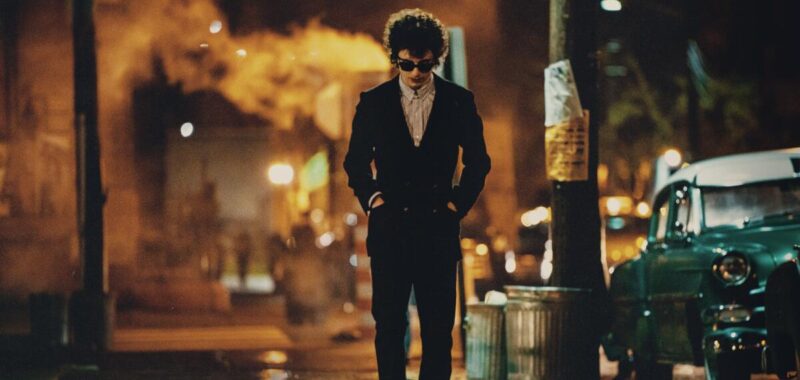When you’ve designed Madonna’s clothes for multiple tours, films and videos, styled Lenny Kravitz and Justin Timberlake, and costumed thousands of Broadway, film and opera performers, you aren’t likely to be intimidated by dressing a criminally insane couple and a Nobel Prize-winning music legend.
In back-to-back films, costume designer and three-time Oscar nominee Arianne Phillips designed the far-ranging wardrobes for Joker and Harley Quinn as a song-and-dance duo in “Joker: Folie à Deux” and for “A Complete Unknown,” starring Timothée Chalamet as a young Bob Dylan.
The sequel to 2019’s blockbuster “Joker” has Joaquin Phoenix reprise and expand his role as Joker/Arthur Fleck and introduces Lady Gaga as Lee Quinzel, also known as Harley Quinn. Phillips’ take on Dylan and the folk music scene of 1960s New York arrives when the film opens on Christmas Day.
“It is the first time I had two films come out in the same quarter,” said Phillips, speaking on a video call. “It’s really great because, for me, my approach and my process are so different on each film. I am not looking to repeat myself but to learn something new on a project.” No doubt she did, starting with her first-time collaboration with “Joker” director Todd Phillips.
The sequel brought an additional first — following the lead of another costume designer, Mark Bridges, who earned an Oscar nomination for “Joker.”
“I never had inherited someone else’s world to build on,” she said. “That gives its own layer of responsibility and reverence to the original piece.”
The two projects couldn’t be more different, or more alike.
Set in 1980s New York, “Joker: Folie à Deux” is a dark, psychological thriller loosely based on DC Comics characters that also includes snazzy song-and-dance numbers in colorful fantasy sequences. “A Complete Unknown” is a biopic covering the seminal four years, 1961 to 1965, when earnest teen Robert Zimmerman left Minnesota and became superstar Bob Dylan in New York.
Though one film is fiction and the other is based on actual events, both stories required adherence to an established idea of the characters. Phillips’ job was to pull that believable essence out of the pop culture ether and connect it to the script, the character’s story arc and, ultimately, the actor.
Both films also feature world-famous actors trying to disappear into beloved characters who have become so woven into the popular consciousness that any variation risks alienation. Joker and Harley Quinn have been reinterpreted in many ways over the decades but have signatures that can be either cliché or helpful identifiers. Phillips had to decide which was which.
Throughout the five years that “A Complete Unknown” took to get finished, with interruptions for the pandemic and the actors’ strike of 2023, Phillips became encyclopedically fluent in all things Bob Dylan.
“What really was the best was reading accounts of Bob through the people in his life,” she said.
Dylan didn’t offer any personal photos to the team, so she read biographies and consulted other Dylan-adjacent sources.
“In most biopics, you see the trajectory of someone’s life from birth to death, and the environment changes. In this case, it was very clear that the way the audience was going to experience Bob’s evolution over these prolific four years was through his hair and what he was wearing, his style,” she said. “You would see this 19-year-old kid evolve into this 24-year-old rock star.”
His denim was key. She enlisted experts at Levi Strauss & Co. to identify the jeans Dylan wore, and when she couldn’t find specific styles in the vintage market, the company remade them. Phillips also modified his straight-leg jeans the way his then-girlfriend Suze Rotolo described them in her memoir — with a denim insert on the inside leg so they’d fit over his boots.
“That was really an early precursor to flares,” Phillips said.
Both films also are period pieces that had Phillips tapping her impressive network of vintage resources — dealers, archivists, collectors and rental houses. Though “Joker: Folie à Deux” had a budget rumored to be near $200 million and a 36-person costume crew, “A Complete Unknown” was the bigger costume task. The ’60s movie had more than 120 speaking parts; Chalamet had nearly 70 costume changes; and the next 20 supporting characters on the call sheet had from 10 to 20 changes each.
“And then we had 5,000 extras. We dressed so many people and in multiple concert scenes. We had to source a massive amount of vintage. We had basically a warehouse of costumes we hunted and gathered,” Phillips said.
For the “Joker” sequel, Phillips purchased vintage clothes as inspiration but custom-made nearly every costume, including the dozens of threadbare prison uniforms, Lee Quinzel’s harlequin-patterned jackets, specially knitted hosiery and many baby-doll dresses (a nod to Quinzel’s stunted maturity). Each film required full-time teams of tailors and textile artists, including a minimum of four who aged and dyed clothes, to give a realistic, lived-in feel.
Each film also allowed Phillips to apply her long experience helping musicians create characters through clothes.
“Costumes are a tool, but really, we are world-building or storytelling on an emotional level and a physical level,” she said. “There’s a quiet experience that the actor can have to help change their posture or inform dance moves.” That experience comes to life when the actors step onstage and we in the audience join them in stepping into the story and back in time.

